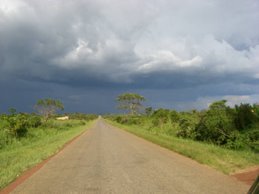On first seeing the camps, I confess I wasn’t shocked. They comprised mud brick and grass thatched circular homes that looked little different to those found across much of rural Africa. It was a long way from the makeshift shelters in many more new refugee and IDP camps you see in other emergencies, fragile structures made from branches, scraps of plastic and UN tarpaulins.
It's clear though that these structures are indicative of the permanence of the displacement. These camps have existed for years. Some were established spontaneously by the war-affected population seeking safety in numbers and proximity to urban centres where UPDF garrisons were based. Others were the creation of the UPDF's Operation Iron Fist military campaigns in which the population was forced from their homesteads and farmland into IDP camps in order to isolate the LRA and cut off their supplies of food and abductees.
 A small segment of a horizon littered with the huts of a vast IDP camp.
A small segment of a horizon littered with the huts of a vast IDP camp.
Apart from cutting people off from their livelihoods and creating dependence on food aid, it is the scale and congestion of the camps that perhaps is most significant. These are not homesteads of 4 or 5 huts surrounded by farm land, where families bring up children in relatively sheltered environments, providing them with instruction on values and ways of life and supervising them. These are towns, 20,000, 40,000 strong. This congestion creates problems akin to urban slums - water, sanitation, health, breakdowns in the social fabric, erosion of traditional values, protection issues...
The fact the UPDF have forced them into these camps, and the rationale behind this, has meant that moving out of the camps 'safe zone' put you at risk not only of being abducted by the LRA but also being shot by the UPDF. The military presence has also been associated with rising prevalence of survival sex and temporary unions.
I sat down with a group of children and asked them what they liked about life in the camp. I got no response. I asked them what they don’t like about living here. "Sometimes we hear gun shots," one replied. More chipped in elaborating on this point. "What do hopes and ambitions do you have for the future?" A diverse range of answers were offered. "To return to our land and farm". "To study hard and become a nurse". "To be President one day". The diversity of answers was in stark contrast to the response to my next question. What fears do you have? ‘Too’ (pronounced ‘toor’) they echoed. Too means death.

It is no surprise therefore that people are desperate for peace and desperate to leave the camps. But for most it has to come in this order - peace first, then return. A formal cessation of hostilities has stood since August 2006 and the Juba peace talks stumble forward slowly. Some have interpreted this as promising enough to move to approved decongestion sites protected by UPDF detaches. Most though remain in the original IDP camps, less convinced and worn down by many a fruitless peace initiative.

Some households have started making mud bricks and collecting the grasses for new huts.
Returning in February will be fascinating. Now is the time to move. Soon bush fires will be spread across the north burning any grass remaining, the new school term will start, and the land will need to be prepared for planting season. So by February some resettlement trends should be clear. But as many people have warned, if the peace talks are derailed or LRA attacks resume, even if only isolated incidents, the resettlement could be reversed and the progress made lost.















































